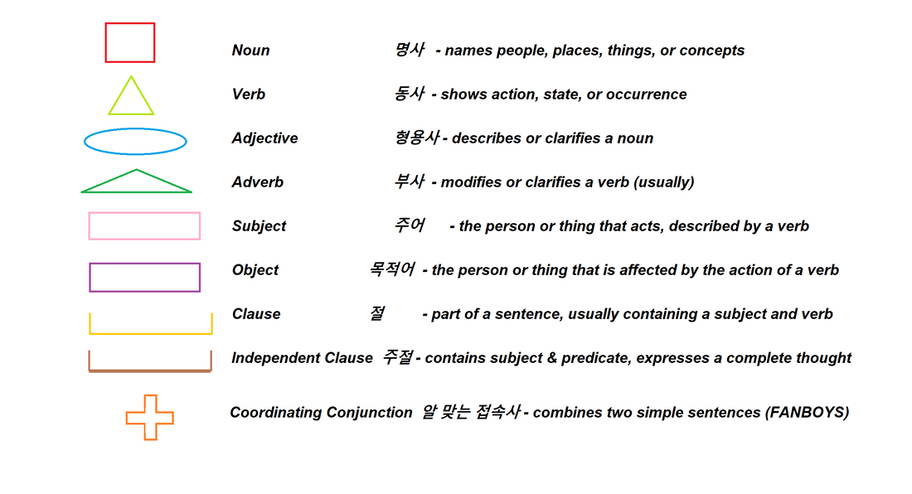1.1 Basic Terms
Before beginning the examples and exercises, please watch the Explanation Video below.
1.1 E1 EXPLANATION: Visual Grammar Key

Text Description of Visual Grammar Key:
Noun 명사 - names people, places, things, or concepts - outlined in a red box
Verb 동사 - shows action, state, or occurrence - outlined in a light green triangle
Adjective 형용사 - describes or clarifies a noun - outlined in a blue oval
Adverb 부사 - modifies or clarifies a verb (usually) - outlined in a dark green triangle
Subject 주어 - the person or thing that acts, described by a verb - outlined in a pink rectangle
Object 목적어 - the person or thing that is affected by the action of a verb - outlined in a purple rectangle
Clause 절 - part of a sentence, usually containing a subject and verb - underlined in yellow
Independent Clause 주절 - contains subject & predicate, expresses a complete thought - underlined in brown
Coordinating Conjunction 알 맞는 접속사 - combines two simple sentences (FANBOYS) - outlined in an orange cross
Subject-verb agreement: English verbs are conjugated differently depending on their subject!
(Hangul has no direct equivalent to this concept, but see Korean Subject/Verb Agreement )
Noun 명사 - names people, places, things, or concepts - outlined in a red box
Verb 동사 - shows action, state, or occurrence - outlined in a light green triangle
Adjective 형용사 - describes or clarifies a noun - outlined in a blue oval
Adverb 부사 - modifies or clarifies a verb (usually) - outlined in a dark green triangle
Subject 주어 - the person or thing that acts, described by a verb - outlined in a pink rectangle
Object 목적어 - the person or thing that is affected by the action of a verb - outlined in a purple rectangle
Clause 절 - part of a sentence, usually containing a subject and verb - underlined in yellow
Independent Clause 주절 - contains subject & predicate, expresses a complete thought - underlined in brown
Coordinating Conjunction 알 맞는 접속사 - combines two simple sentences (FANBOYS) - outlined in an orange cross
Subject-verb agreement: English verbs are conjugated differently depending on their subject!
(Hangul has no direct equivalent to this concept, but see Korean Subject/Verb Agreement )
Examples of Basic Terms:
1.1 E2 Example SIMPLE SENTENCES
- Main Verb (imperative) sentences: Think! Breathe. 걸으세요 = Walk! Remember… Stop!
'Think' is a verb. In the imperative form, it could be a command ordering someone to use their brain, or to behave more intelligently.
'Breathe' is a verb ('breath' is the noun form!). Here it is a way to encourage someone to stay calm and control their breathing.
'Walk' is a verb. This might be the way you train your dog to stop and go when you are walking with him.
'Remember...' is a verb. In the imperative, it is a way to tell people to use their memory -
‘Stop’ is a verb. In the imperative form, it expresses a complete thought - a command to cease action, similar to 하지마 (hajima!) - Subject + Main Verb: I go. She goes. They ate.
is a habit or frequently repeated. For example: "I usually go to E-Mart on the weekend."
' She' is the subject, meaning that the sentence is about a female (probably a human!) 'goes' is the correct form of 'go' when using subject/verb agreement.
‘They’ is the subject, meaning that the sentence is about two or more people (probably humans: It could also refer to dogs, or lions, or aliens,
depending on the context!) ‘ate’ is the verb ‘eat’ in past tense, meaning that the action has happened and is completed.
For example: "They ate chicken for supper last night."
Study!
(verb)
I study.
(subject + verb)
I study English.
(subject + verb + object*)
I study simple English.
(subject + verb + adjective + object*)
I carefully study simple English.
(subject + adverb + verb + adjective + object*)
Drink!
She drinks.
She drinks water.
She drinks lemon water.
She often drinks lemon water.
( * Don't worry about the 'object' right now. We'll explain that later in more detail.
Just add a noun at the end of your sentence that goes with the verb you used!
This noun 'object' usually answers the question word 'what?'. What do you study? What does she drink? )
(verb)
I study.
(subject + verb)
I study English.
(subject + verb + object*)
I study simple English.
(subject + verb + adjective + object*)
I carefully study simple English.
(subject + adverb + verb + adjective + object*)
Drink!
She drinks.
She drinks water.
She drinks lemon water.
She often drinks lemon water.
( * Don't worry about the 'object' right now. We'll explain that later in more detail.
Just add a noun at the end of your sentence that goes with the verb you used!
This noun 'object' usually answers the question word 'what?'. What do you study? What does she drink? )
1.1 E4 Expansion
You can watch this video: How to Write Simple Sentences.
(Please note that it has additional vocabulary, such as 'transitive verb' and 'clause', which we have not yet introduced.)
Now, see if you can write some simple sentences and make them more interesting with adjectives and adverbs!
Simple Sentences with Adjectives: My wife is smart. My smart wife is a good cook. Her pizza is delicious. She has brown hair.
Simple Sentences with Adverbs: My brother is really smart. I write very well. My friend walks quickly. → My friend walks amazingly quickly.
________________________________________________________________________________________________________________________
You can also play an old-fashioned adventure game here: Floyd Danger - Sorting Sentences
("This sentences vs. fragment game sends Floyd Danger on an adventure to get the book of complete sentences. Students will help him collect coins and unlock doors by categorizing complete sentences, sentence fragments, and run-on sentences." Note: one gameplay per person for basic free membership)
You can print these worksheets and fill them out for more practice: Grammar Galore Workbook
You can watch this video: How to Write Simple Sentences.
(Please note that it has additional vocabulary, such as 'transitive verb' and 'clause', which we have not yet introduced.)
Now, see if you can write some simple sentences and make them more interesting with adjectives and adverbs!
Simple Sentences with Adjectives: My wife is smart. My smart wife is a good cook. Her pizza is delicious. She has brown hair.
Simple Sentences with Adverbs: My brother is really smart. I write very well. My friend walks quickly. → My friend walks amazingly quickly.
________________________________________________________________________________________________________________________
You can also play an old-fashioned adventure game here: Floyd Danger - Sorting Sentences
("This sentences vs. fragment game sends Floyd Danger on an adventure to get the book of complete sentences. Students will help him collect coins and unlock doors by categorizing complete sentences, sentence fragments, and run-on sentences." Note: one gameplay per person for basic free membership)
You can print these worksheets and fill them out for more practice: Grammar Galore Workbook
Fun Sentence Building Exercise:
Eat!
____________________
(add your best friend’s name as the subject. Remember that the verb changes to agree with the subject...)
_________________________
(add your friend’s favorite food)
__________________________________
(add an adjective which describes that food)
_______________________________________
(add an adverb which tells how your friend eats, either before the verb or at the end of the sentence)
Eat!
____________________
(add your best friend’s name as the subject. Remember that the verb changes to agree with the subject...)
_________________________
(add your friend’s favorite food)
__________________________________
(add an adjective which describes that food)
_______________________________________
(add an adverb which tells how your friend eats, either before the verb or at the end of the sentence)
1.1 E5 External Links
Check out the link http://www.butte.edu/departments/cas/tipsheets/grammar/parts_of_speech.html for more information and details.
Check out the link http://www.butte.edu/departments/cas/tipsheets/grammar/parts_of_speech.html for more information and details.








